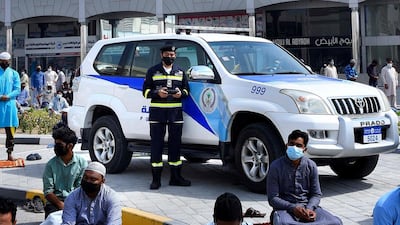Sharjah Police will increase patrols in residential areas during Ramadan to ensure coronavirus safety rules are followed at iftar gatherings.
Community iftars are banned in the emirate, but families can host meals at home if they follow precautionary measures.
"We will continue with our efforts that we started during Ramadan of last year," said Maj Gen Saif Al Shamsi, Commander-In-Chief of Sharjah Police.
“There will be tighter controls and increased field inspections during Ramadan.”
This will be done with the help of officials from the municipality, the economic department and other ministries.
Giving iftar meals and advertising special offers for meals is prohibited.
Distributing meals to the needy should be done only through registered charities.
Maj Gen Al Shamsi said police would continue raising awareness and remind people of the safety rules.
“Individuals should be responsible and aware of the consequences of not following the safety rules,” he said.
“Authorities and the public complement one another in combating the spread of the disease.”
He hoped people will act responsibly during the holy month.
“When the outbreak first happened, people did not comprehend the scale of the pandemic, but now that has changed.”
Despite repeated reminders, police officials said some people continued to break the rules.
The most common offences included not wearing masks, failing to maintain social distancing and exceeding the number of passengers in one vehicle.
Police issued 42,219 fines for breaking coronavirus safety rules in 2020 and 21,000 from January this year to date.
Maj Gen Al Shamsi also said a new Sharjah field hospital would be operational next week.
“I don’t expect this will be a temporary hospital given the very advanced equipment brought to the place,” he said.
In February, the emirate reduced capacity at malls to 60 per cent and limited numbers on public transport and at cinemas, entertainment venues, gyms, private beaches and swimming pools to 50 per cent to stop the spread of the virus.
All concerts and musical shows, including those performed at Al Majaz Amphitheatre and the recently opened Khor Fakkan Amphitheatre, were postponed for four weeks.
People were told that further restrictions could be required to limit the spread of the virus.
Lt Col Hamdan Al Tunaiji, head of the emergency and crisis department at Sharjah Police, said communities have largely observed safety measures.
“But the latest updates made to the restrictions will not be the last because the pandemic has forced a new reality on all of us,” he said.
He said rules will be revised and urged people to follow the guidelines to help ease restrictions.
“Regulations were tightened in response to the recent rising number of positive tests,” he said.














